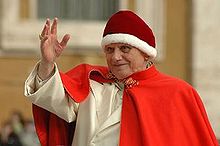Type a search term to find related articles by LIMS subject matter experts gathered from the most trusted and dynamic collaboration tools in the laboratory informatics industry.


A camauro (from the Latin camelaucum and from the Greek kamelauchion, meaning "camel-skin hat") is a cap traditionally worn by the pope, the head of the Catholic Church.
Papal camauros are made from red wool or velvet with white ermine trim, and are usually worn during the winter in place of the zucchetto. Like the biretta worn by lower clergy and the mortarboard worn by academics, the camauro derives from the academic cap (the pileus), originally worn to protect tonsured clerical heads in the cold season. It is often worn with a red mozzetta.
The camauro has been part of the papal wardrobe since the 12th century. Until 1464, it was worn by cardinals, without the ermine trim; from that date, the camauro became exclusively a papal garment and cardinals wore the scarlet biretta instead. The papal camauro fell into disuse after the death of John XXIII in 1963. It was revived once only in December 2005 by Benedict XVI. Benedict's choice prompted media comparisons to Santa Claus and Father Christmas;[1] Saint Nicholas, who may have been the inspiration for the legend of Santa Claus, was bishop of Myra in the early fourth century.[citation needed]
A camauro was part of the headdress of the Doge of Venice, worn under the corno ducale or stiff peaked cap. Every Easter Monday, the doge headed a procession from San Marco to the convent of San Zaccaria where the abbess presented him a new linen camauro crafted by the nuns.[citation needed]